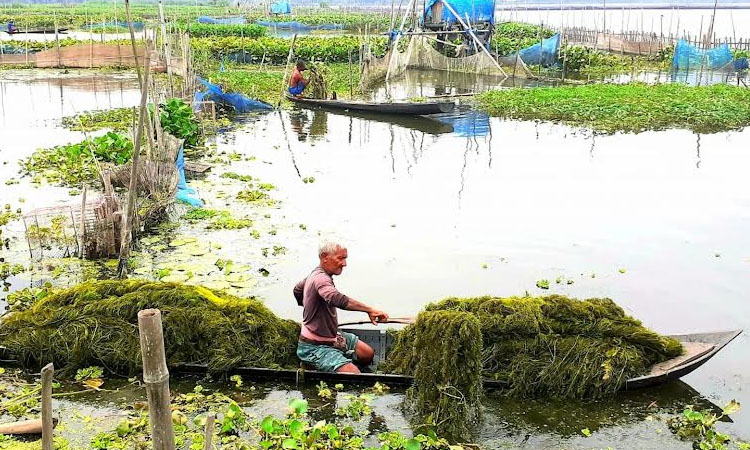News Flash

KHULNA, Sept 22, 2025 (BSS) - Natural lime moss, a type of algae locally known as chuna sheola, has become a vital source of livelihood for more than five lakh people across five upazilas in Jashore and Khulna - Abhoynagar, Monirampur, Jashore Sadar, Dumuria and Fultala.
Fish farmers are increasingly using different types of algae, including chuna sheola, collected from wetlands and water bodies, as a natural feed in aquaculture. Farmers said the practice ensures faster fish growth, lowers production costs, keeps fish fresh, reduces the risk of diseases, and significantly cuts dependence on commercial feed.
Gobinda Saha, a fish farm owner of Abhoynagar, told BSS, "Algae-fed fish grow naturally without harming the environment. It also creates a suitable ecosystem for native species, which helps farmers earn better profits."
During recent visits to several wetland areas, both men and women were seen harvesting different types of algae, especially lime moss. Local women, many of them previously unemployed, are now earning Taka 500-700 daily from collecting algae.
"This work has become a source of income for many jobless women in our area," said Shamsunnahar, a resident of Abhoynagar upazila. "Many women benefit by selling algae, mostly lime moss, to shrimp enclosure and pond owners as it is a natural food for fish."
Fish trader Prashanta Roy noted that the industry has created consistent employment opportunities.
Algae is collected from rivers such as the Shree, Hari, Teka and Bhairab, as well as from local wetlands, and transported by vans or small trucks to other parts of the country. A truckload of algae sells for Taka 500-1,000 depending on its quality and demand.
Abdullah Al Mamun, Project Director of the Sustainable Coastal and Marine Fisheries Project in Khulna, said many fish farmers rely on natural algae, including lime moss, alongside other feed. He cautioned, however, that excessive use of algae in ponds can damage water quality and even cause fish mortality.
"It should be applied carefully, though algae remain an eco-friendly option. For many in flood-affected areas like Bhobodoho, its role in sustaining livelihoods is undeniable," he added.
He further said algae are among the most diverse and ecologically significant organisms. Found in a wide range of environments-from rivers and freshwater bodies to soils and even snow-algae play critical roles in sustaining ecosystems, supporting the food chain, producing oxygen and regulating climate.